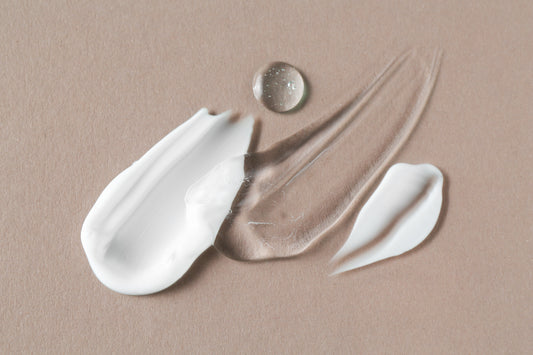If you are looking for a way to fight skin inflammation and redness, look for products that carry one or more of these ingredients.
Aloe
Aloe has long been used to treat burns and wounds. Studies show that the gel from the plant has anti-inflammatory properties that may work better than one percent hydrocortisone on calming swollen, irritated skin.1 It’s commonly found in skincare products to help calm the inflammation and redness caused by acne, psoriasis, and other types of rashes. Be careful not to use aloe on infected skin. While it is good for burns, it can hinder the healing process when skin is infected.13
Foundation Skincare’s Azelaic Acid’s 14% Cream contains aloe leaf juice that soothes red, inflamed skin. It also hydrates and protects by strengthening your skin’s moisture barrier. Containing the highest concentration of azelaic acid available without a prescription, it’s the perfect product to fight acne and rosacea flare ups while being gentle enough to use with sensitive skin.
Calendula
Calendula is commonly known as the marigold flower and has been used medicinally since the 12th century. The flower contains a powerhouse of compounds that accelerate healing and treat burns, wounds, hyperpigmentation, dermatitis, and psoriasis.2 It also can help reduce sun damage to skin and can be found in many sunscreens.
While using calendula on your skin is generally safe, check with your doctor before using calendula if you’re
-
Allergic to plants in the Asteraceae/Compositae family, such as ragweed, daisies or marigold.
-
Pregnant or breastfeeding. Calendula can upset hormone levels that could affect pregnancies.
-
Taking blood thinners or blood pressure medication.
-
Have a planned surgery.14
Chamomile
If you’ve ever had poison ivy, you already know how chamomile soothes itchy, inflamed skin. Chamomile has been used since ancient times as a medicinal herb to treat several conditions that cause pain and inflammation.3 It has both anti-inflammatory and antimicrobial properties that calm red, irritated skin while protecting against infections and acne breakouts.
Use caution or consult a doctor before using chamomile if you:
-
Have asthma, as it can make it worse.
-
Are pregnant. There is a risk of miscarriage.
-
Are allergic to daisies, chrysanthemums, asters, or ragweed.
-
Take blood thinners, sedatives, or blood pressure or diabetes medication.15
Green Tea
Green tea acts as both an anti-inflammatory and an antioxidant. Studies show that it can reduce oil production and acne in skin.4 It also gives some protection against skin cancer. Its regenerative abilities are boosted when paired with vitamin C. It can ease redness and inflammation caused by psoriasis, eczema, and dandruff.
Hyaluronic Acid Lotion combines both chamomile and green tea extracts to control inflammation, while hydrating and improving skin tone and texture. If you want skin that looks plumper and firmer while helping control blemishes, try this.
Vitamin C
Vitamin C is vital for healthy skin. It promotes collagen production and decreases melanin production so when levels are high, skin is plumper and has less discoloration. While vitamin C occurs naturally in skin, it can be depleted by age or sun exposure and damage.5 Vitamin C also strengthens the natural skin barrier that holds in moisture, reduces wrinkles, and speeds healing of wounds. It pairs well with vitamin E.6
Vitamin C Lotion 20% gives your skin all the anti-inflammatory benefits from the highest concentration of vitamin C available in a lotion. Boosted by the antioxidant and hydrating power of vitamin E, it’s safe to use with sensitive skin. Plus, while it hydrates skin and protects it from cancer, it helps skin become firmer and brighter.
Vitamin C Lotion 20%
• Increased collagen production renews skin
• Antioxidant power repairs discoloration
Cucumber
Cucumbers are packed with vitamin C and folic acid that not only provide soothing hydration to skin but fight inflammation.7 It helps reduce swelling and irritation caused by sunburn, insect bites, and rashes, as well as acne breakouts. It’s often included with other skin products to boost hydration and help fight puffiness.
Licorice Root Extract
Licorice root extract contains compounds with anti-inflammatory, antioxidant, and antimicrobial properties. Studies show it can protect against skin cancer and fight redness caused by inflammation from both acne and eczema.8 In fact, licorice root extract has shown to work as well as one percent hydrocortisone on eczema and atopic dermatitis and reduce the swelling and redness associated with rosacea. Don’t use it if you're pregnant or breastfeeding. Use caution if you take medication to control blood pressure, cholesterol, or blood clots.9
Ceramides
Ceramides are a type of lipid or fat that create a moisture barrier for skin. They help hydrate skin, control inflammation, and even out skin tone. They are particularly helpful in repairing the skin barrier for people with dry or damaged skin.10 Ceramides decrease as you age and skincare products with ceramides can protect against UV damage and rejuvenate skin.
Foundation Skincare’s Niacinamide Lotion 10% uses ceramides to moisturize skin and help it retain elasticity and firmness. It also helps even out skin texture and tone while protecting against acne breakouts. A powerhouse addition to your skincare routine, it’s a must-have to help keep skin healthy and glowing. Pair with our Vitamin C Lotion 20% to help your skin be its best.
Niacinamide Lotion 10%
• Calms acne, minimizes flare-ups
• Improves inflammation & redness
Squalene
Squalene is a natural oil and can be a great choice to moisturize skin without clogging pores. Skin care products that contain squalene can boost collagen production, reduce inflammation, and slow the sign of aging. It not only helps ease dry skin, but can reduce redness and swelling caused by psoriasis, rosacea, eczema, and acne.11 It is lightweight and safe to pair with retinols.
Jojoba Oil
Jojoba oil is a natural moisturizer containing vitamin E, vitamin B, copper, and zinc.12 Its anti-inflammatory properties means it helps soothe redness and inflammation caused by sunburn, psoriasis, and eczema. It also helps increase collagen production, smoothing out fine lines and wrinkles. It’s a good choice to minimize and heal acne scars and stretch marks.
As always, stop using any product immediately if you notice a rash or other allergic reaction.
If you are overwhelmed by the choices, turn to Foundation Skincare for products you can trust. All our products are created with the highest quality ingredients and are tested and approved by dermatologists.
References:
-
https://pubmed.ncbi.nlm.nih.gov/18253066/
-
https://pmc.ncbi.nlm.nih.gov/articles/PMC10142266/
-
https://pmc.ncbi.nlm.nih.gov/articles/PMC2995283/
-
https://pmc.ncbi.nlm.nih.gov/articles/PMC9370301/
-
https://pmc.ncbi.nlm.nih.gov/articles/PMC5579659/
-
https://www.health.harvard.edu/blog/why-is-topical-vitamin-c-important-for-skin-health-202111102635
-
https://www.healthline.com/health/beauty-skin-care/cucumber-for-skin
-
https://pmc.ncbi.nlm.nih.gov/articles/PMC7168306/4
-
https://www.healthline.com/nutrition/licorice-root
-
https://pubmed.ncbi.nlm.nih.gov/39912256
-
https://health.clevelandclinic.org/squalane
-
https://health.clevelandclinic.org/jojoba-oil-benefits
-
https://www.healthline.com/health/beauty-skin-care/aloe-vera-for-face
-
https://www.mountsinai.org/health-library/herb/calendula
-
https://www.mountsinai.org/health-library/herb/roman-chamomile






